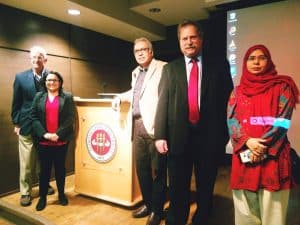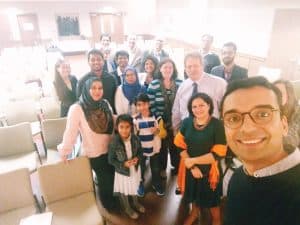The 5th South Asian Media and Cultural Studies conference was held on January 31- February 1, 2019 at the Center for Global and Multicultural Engagement (CGE) at Florida State University. This year’s theme, “Cultural Disruptions: Media and Social Change in South Asia”, focused on the reconfiguration of cultural, social, economic and political relationships in South Asia, in parallel with the epochal shift in the media and communication practices in the region.
The SAMCS Conference gave attendees a new perspective of South Asia and was a great opportunity for sharing and learning about the many cultures in these countries. Vaibhav Diwanji, working on his Ph.D. in Communication, presented research titled “#TimesUp for #MeToo? Speech Acts in Twitter Activism in India and the US”. In this research, Dr. Juliann Cortese, Dr. Katherine Dale, and Vaibhav Diwanji explore speech act recognition on Twitter through the lens of the hashtags #MeToo and #TimesUp. These hashtags show how social media can globalize a serious issue and unify voices across nations, regardless of their economic development status. Speech acts are a way to conceptualize speech as action. This holds true for communication on any platform, including social media platforms such as Twitter.
“This was my third consecutive year participating in the SAMCS conference,” says Diwanji. “Since the last couple of years, I have been fortunate to be a part of the core organizing committee of the conference. I presented two papers this year and was also looking after the technological aspects, especially organizing and leading the conference calls with the virtual participants from different parts of South Asia throughout the day. The conference was a great opportunity to learn about some of the interesting research projects in the South Asian region and also network with scholars from different countries. I strongly encourage my colleagues to attend and also to participate in the next year’s SAMCS conference.”
Asif Shaikh, School of Information doctoral candidate, presented his research titled “Penalty as a Policy in Preventing Fake on Electronic and Social Media: An ICT and law policy in Pakistan context”. From online shopping to social networking sites, the advent of the Internet has transformed the manner in which society carries out their online routine activities. Over the last decade, the spread of Internet-connected smart devices has made a significant impact on societal norms. With every new technology comes abuse, and online media (including social media & smartphone applications) are no exception. Malicious entities have come to rise that are designed specifically with the purpose to harm, mislead, exploit, and manipulate media discourses with rumors, spam, malware, misinformation, slander, or even just noise. This results in several levels of damage to society. The adverse impact of faking by malicious actors on individuals, institutions, and society by malicious actors is far-reaching. The increasingly dependent nature of Internet use in our society creates criminal opportunity structures in cyberspace, where motivated offenders can have unlimited access to vulnerable targets, often in the absence of capable guardians.
“It was a great social networking and learning experience to interact with the South Asian scholars and to know their areas of research at this platform,” says Shaikh. “I enjoyed the live webcast and was delighted to answer the questions from the virtual audience.”
Dr. Mariam Shaikh, Ph.D alumnus from the School of Communication and organizing committee member, weighs in on the selection of Asif and Diwanji’s research for the conference. “The organizing committee chose Asif’s presentation because his research work focused on how deceptive use of technology can bring on cultural disruptions, while Vaibhav’s work raised concerns emerging from social activist movements. Not only were the subjects were very much connected to the conference theme in the South Asian media context but they also depicted how vibrant and diverse are the research tracks are of emerging scholars at CCI. We are glad that their presentation generated scholarly debate and brought insights for future research in South Asian Media and Cultural Studies.” Other members of the organizing committee such as Dr. Azmat Rasul, and Dr. Stephen McDowell were excited to see all the FSU students and Tallahassee community members in attendance and hope to make an even greater impact at next years’ conference.




